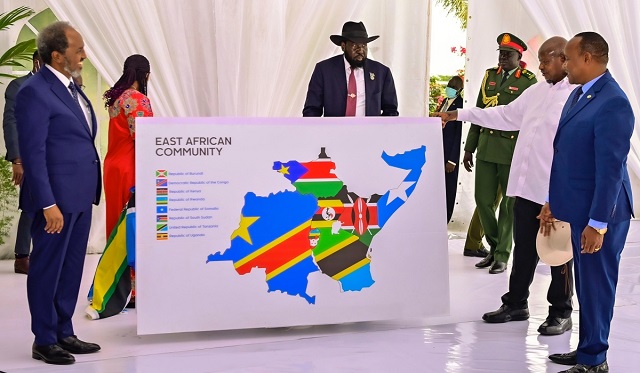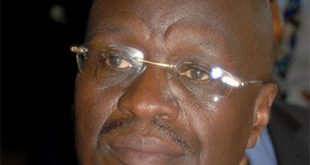
ANALYSIS | RONALD MUSOKE | In response to the growing calls to have the East African Community Treaty amended to reflect its current state, regional foreign and East African Community affairs ministers have demanded the process be accelerated.
This was one of the resolutions reached by the ministers from Burundi, DR Congo, Kenya, Rwanda, Somalia, South Sudan, Tanzania and Uganda during a recent retreat in Zanzibar. The retreat which took place from July 6-8, followed a directive of the 23rd Extraordinary Summit of East African Community heads of state held on 7 June 2024.
Last year, President William Ruto noted the need for the amendment of the EAC Treaty arguing that it was “inappropriate to use a formative law created in 1999 to manage an expanded membership.” During a meeting in Nairobi with Joseph Ntakirutimana, the Speaker of the East African Legislative Assembly (EALA), President Ruto said the bloc should adapt to the needs of new members including language needs as well as openness to admit new members without restrictions.
In June, 2021, Tanzanian President Samia Suluhu Hassan also called upon the bloc’s leaders to comprehensively review the East African Community Treaty and other legal instruments to reflect the current times.
“There is need to not only review the Treaty but other instruments as well to align them with what we have already done, and what we aspire to do,” Suluhu said.
Suluhu said the community partner states are all at different levels of development and their ability to meet statutory obligations to the EAC vary. She said this should be looked into so all members are able to meet their obligations.
Changing reality
The treaty to establish the East African Community came into force in 1999 when Kenya, Tanzania and Uganda chose to revive the bloc following its dissolution in 1977. However, five other countries including; Burundi, DR Congo, Rwanda, Somalia and South Sudan have since joined the bloc.
The 1999 EAC Treaty gives conditions for admission including adherence to good governance, democracy, rule of law, observance of human rights and social justice, potential members’ contribution to strengthening proximity to and the inter-dependence between it and the partner’s establishment and maintenance of a market-driven economy; and social and economic policies being compatible with those of the community.
Kenya, Uganda and Tanzania acceded to the treaty 25 years ago and Burundi and Rwanda acceded to the treaty in 2007 and became full members in July 2007. In 2016, South Sudan joined the East African Community when President Salva Kiir signed the accession treaty in the Tanzanian commercial city of Dar es Salam.
On July 11, 2022, the Democratic Republic of Congo became the seventh member of the EAC bloc after depositing the “instrument of ratification” with the East African Community Secretary General while, on March 4, this year, Somalia became the eighth full member of the EAC bloc after depositing her instrument of ratification of the Treaty of Accession with the East African Community Secretary General in Arusha.
All the eight member states are now bound together by the treaty which is supposed to help them cooperate in all sectors, programmes and activities that promote the four pillars of regional integration.
But some regional integration experts argue that the EAC Treaty was originally written for three countries and, reaching consensus was relatively easier back then. Back then, language was also pretty straight forward as the three countries use both English and Kiswahili for communication.
Not anymore. For instance, until 2021, the official language of the EAC bloc was English even when the official languages of members; Burundi, Rwanda and DR Congo, is French. This was somehow fixed during the EAC Heads of State Summit in 2021 when the French language was formally endorsed as an official language of the EAC. But, up to now, this has not been adjusted in the treaty.
In addition, in the treaty’s current state, all the eight members have equal voting rights and mostly make decisions via consensus and rotational policy when it comes to key leadership. Yet, some members have been found to be reneging on their obligations.
Article 146 of the EAC Treaty says that the Summit may suspend a member state from taking part in the activities of the community if the member state fails to observe and fulfill the fundamental principles and objectives of the treaty, including failure to meet financial commitments within a period of one-and-half-years.
Last October, a Kenyan Parliamentary Committee called for a review of the East African Community Treaty to grant veto powers to the biggest contributing states. In its report tabled in the Kenyan Parliament, the Committee on Regional Integration recommended a review of the EAC Treaty to allow partner states’ contributions be based on their ability to pay and those who pay more to have veto powers. It also called on the founding partner states of the EAC to consider paying contributions due for South Sudan and Burundi on the big brother spirit.
“The founding partner states could also consider paying contributions due for South Sudan and Burundi on the big brother basis and review the EAC Treaty to allow partner states’ contributions to be based on the ability to pay and retention of veto power by the highest paying partner states,” noted the report.
“The current financial shortages occasioned by delayed partner state contributions and dwindling development partner support continue to adversely affect the performance of all EAC institutions thus frustrating the implementation of key projects and programmes meant to uplift the lives of East Africans.”
These and many other realities are the reasons behind the current push for a review and amendment of the East African Community Treaty
Division over amendments
However, Godber Tumushabe, the Associate Director of the Great Lakes Institute for Strategic Studies, a Kampala-based thinktank, told The Independent that he does not believe the current format of the East African Community Treaty needs serious amendment to make it work for the bloc. The principles in the treaty are general enough for it to be able to work for all members, he told The Independent.
“For instance, the treaty speaks to the bloc being people-centred, market-driven and private-sector led while in terms of programmes, the focus is on infrastructure and energy development among others.” He says the other concerns of membership contribution or official language are “really basic.”
He told The Independent the EAC Treaty is an international treaty in terms of character. He says if a new member finds certain articles or clauses in the treaty uncomfortable, the state can accede to it with reservations.
“Unless there are serious obstacles in the Treaty which are preventing the bloc from functioning well, I don’t see the calls for the treaty’s amendment,” he said.
But Herbert Kafeero, the Programmes Manager at the Southern and Eastern Africa Trade Information and Negotiations Institute (SEATINI), a regional non-profit working on issues such as trade, fiscal and economic development in eastern Africa, says reviewing the EAC treaty is not only valid in the wake of the expanded bloc but also because of the context and circumstances in which the EAC finds itself in.
“We have new members as a bloc but there are also issues that an amended treaty would take care of,” he told The Independent on July 12. Kafeero says SEATINI has over the last two decades been at the forefront of trying to review the East African Community Treaty so it reflects the current times.
He mentions the current treaty not having enough punitive provisions for countries like Kenya which has decided to sign an economic partnership agreement (EPA) with the European Union, all the while sidestepping the concerns of its peers in EAC bloc.
“We are increasingly seeing members within the EAC focusing on their national interests at the expense of the EAC treaty principles such as the ‘Principle of Variable Geometry.” He says Kenya is categorised as a developing country while the rest of the EAC members are least developing countries. He says SEATINI has always argued that the bloc should be treated as one bloc during such negotiations to ensure that benefits accrue to all members.
“Negotiations between the EU and the EAC stalled for two decades and instead, we saw the EU signing an EPA with Kenya,” he said, “We had wanted to move together as a region but instead the EU is balkanizing the EAC.”
He also notes that amending the treaty to ensure a stronger dispute resolution mechanism on the issue of recurrent non-tariff barriers would go a long way in strengthening the bloc. Kafeero told The Independent that, at the moment, the East African Court of Justice, whichis the entity charged with resolving such tiffs, is too overwhelmed and cannot resolve issues around the non-tariff barriers in time. This can only be resolved by a dedicated body that the EAC bloc should set-up.
“The review of the EAC Treaty should not only go with the bulge in membership but should also look at the progress of the regional integration process in terms of economic outlook, the energy transition, and climate change among several contemporary issues,” Kafeero says.
According to a communiqué from the East African Community Secretariat dated July 8, the East African ministers also discussed the deteriorating humanitarian and security situation in eastern DR Congo, inter-state relations and disputes, peace support operations in the Community including the East African Community Mutual Defence Pact and the EAC Council of Ministers on Peace and Security, as well as the issue of sustainable funding mechanism for the community.
The ministers in attendance included; January Yusuf Makamba, Tanzania’s minister of foreign affairs and East African Cooperation, Gracia Yamba Kazadi, DR Congo’s vice minister of foreign affairs, Amb. Albert Shingiro, Burundi’s minister of foreign affairs and development cooperation, Dr. Musalia Mudavadi, Kenya’s Prime Cabinet Secretary and minister of foreign and diaspora affairs.
Others in attendance were; Amb. Olivier Nduhungirehe, Rwanda’s minister of foreign affairs and international cooperation; Ali Mohamed Omar, Somalia’s state minister of foreign affairs in charge of EAC affairs; Deng Alor Kuol, South Sudan’s minister for East African Community affairs who is also the current chairperson of the East African Community council of ministers; and Rebecca Kadaga, Uganda’s First Prime Minister and Minister of East African Community affairs.
 The Independent Uganda: You get the Truth we Pay the Price
The Independent Uganda: You get the Truth we Pay the Price




Hi
I agree with what Mr. Kafero has submitted. The member states of the EAC need to push as a block. The rest of the world prefers to isolate them because it works for them. Balkanization perpetuates the interests of the 1884-5 period when Africa was divided. We need to move away from this to actual unification of Africa. EAC is an opportunity to trigger the unification of Africa. Another is the Sahel States which need our support. As EAC can we have a long term plan to move away French and English as official languages and have one language – maybe Kishwahili.